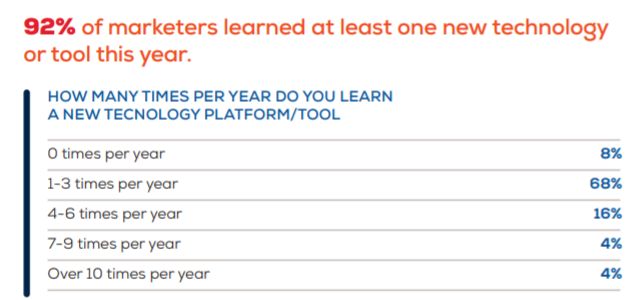Take a page from the book of small-company marketers—and you just might be surprised by the results.
While working on the 2019 Marketer Happiness Report, we looked at the data by company size.
It wasn't surprising that the reported behaviors of marketers at the smallest of companies often differed from those at larger companies—but it got us thinking...
Are there things these small-company marketers are doing, in some cases out of necessity, that we should all consider incorporating into our routines? Is their hustle something we could all learn from?
The report found that these marketers are more likely than the rest of us to do the following.
1. Learn to use more tech tools
Fully 92% of marketers surveyed reported that they make time to learn at least one new technology per year. And those who work for small businesses are more likely to learn to use more tools than those at larger companies.

That makes sense: Marketers at small companies are sometimes a one-man-or-woman show, so there's simply nobody else to share the load.
But we're happy to see they're not taking the easy way out: not learning and adopting new technologies. Instead, they're learning more than the rest of us! And that gives their companies, as well as themselves, an edge.
So, this is a challenge for all of us to up our game, to not be content to have someone else be the expert on tools we always hear about but don't know how to use.
It's smart to be a practitioner who is willing to learn at least the basics of new and popular technologies. You'll improve your usefulness at your current job—and get a potential leg up in future job searches.
2. Intentionally focus on fewer projects
Amazingly, rather than being stretched too thin, marketers at small companies say they intentionally take on a limited number of projects—presumably what they know they can accomplish. They also report being less likely than marketers at bigger companies to be bogged down in distractions that prevent them from completing tasks.
Couldn't we all benefit by being more intentional about the work we take on, and how we execute it?
Practice saying "no" when it's necessary, as well as setting reasonable deadlines. Of course you want to be known as a marketer who can "do it all," but it's important for your own sanity, as well as the quality of your work, that you establish protocols and boundaries that keep you from getting taken advantage of by other departments and colleagues.
3. Meet in-person with people outside your company to share ideas
In many cases, small-business marketers don't have other marketers to collaborate with in their own offices; if they want to brainstorm with a fellow marketer, they have to look elsewhere.
But the reality is that we've all become more insular as technology continues to encroach on our lives. So challenge yourself to get out and talk to fellow marketers more often. Who knows what you might learn!
Find a marketing-networking event happening in your area, sign up for a conference, or simply grab coffee with a friend who's also a marketer. Sometimes it's great to talk to other marketers in your industry, but you'll also benefit by trading ideas with those who do something completely different from what you do.
4. Have one-on-one phone conversations with people outside of your company to share ideas
If you can't find the time to meet up with other marketers outside your company, at least have regular check-ins with a fellow marketing friend to share ideas—to be each other's sounding board. You're bound to spark insights and ideas.
If you don't know any other marketers well enough to have a phone chat with them, find a trusted friend who is willing to listen to your current challenges and insights and trade their own.
Even if their line of work is totally unrelated to yours—engineering, banking, or even baking—you'll be surprised about the power of an honest, open, brainstorming, solution-finding conversation.
Add it to your calendar and treat it like you do any other important conference call.
5. Be involved in mentor relationships
The most fulfilled marketers we surveyed said they're involved in mentoring. That makes sense: As a mentee, you're being challenged, guided, and inspired (at least ideally); as a mentor, you're getting fresh new perspectives and feeling helpful.
Even Melanie Whelan, the CEO of SoulCycle, recently discussed how she is being mentored by a Millennial! She wants to see the world around her from a Millennial's perspective.
What's not to like?
If your company doesn't offer a formal mentor program, you can still create these types of relationships that are fruitful for both parties. (Or maybe you can help to start a formal mentor program!) If your company already offers a program, sign up and get involved.
* * *
We challenge you to consider adopting these habits of small-company marketers. They're on to something good!
Take a look at the full research in the 2019 Marketer Happiness Report.




